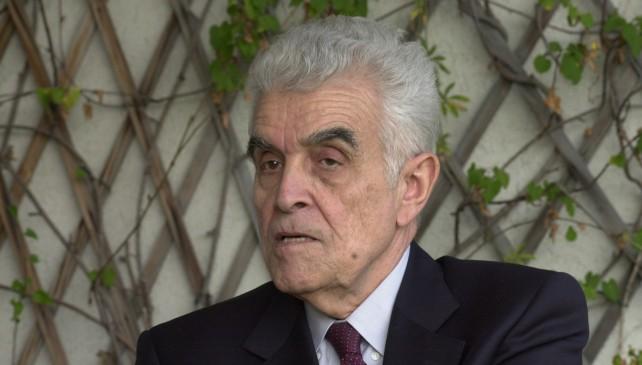This text was first published as the preface of the Brazilian edition of Le Tragique et la Pitié. Discours de réception de René Girard à l’Académie française et réponse de Michel Serres (Paris: Le Pommier, 2007). René Girard, Michel Serres, [O trágico e a piedade: Discurso de posse de René Girard na Academia Francesa e discurso de recepção de Michel Serres (São Paulo: É-realizações Editora, 2011), pp. 9-17].
23, quai de Conti, Paris; 15 December, 2005
I am looking up at the round seventeenth-century Louis Le Vau dome of the Institut de France, which is hanging over the oval room where the ceremony of the election to the 37th seat of the Academie Française is ready to begin. It’s a bright day in mid-December and a soft light fills the distinctive hybrid architecture, partially baroque, partially classic, of the large hall which was once the Chapel of the Collège des Quatre-Nations, and now, after the Napoleonic reorganization of the Academie, the official meeting room of “Les Immortels’, as the forty members are named. There is a soft buzz while the invited guests find their seats and look around for familiar faces, friends, colleagues or eminent personalities. I am seated in one of the back seats in the far left corner with respect to where the President of the séance, Michel Serres, will be giving his response to the reception speech of the elected candidate, René Girard. To my surprise, a few minutes after I enter the room, I spot a few familiar faces coming in and looking for nearby seats: almost all the members of the French and Italian Department at Stanford, where I spent five intense years of my life, are here to celebrate René, who retired from teaching ten years before, in 1995, and who now is to be honoured with the election to the highest and most prestigious rank of the French academic and intellectual elite. I slowly walk out from my spot to greet Sepp Gumbrecht and Robert Harrison, my advisors at Stanford; there is also Jean-Pierre Dupuy, former professor of mine and long-standing collaborator of René’s, and a young colleague, Laura Wittman, who joined the department after I left Stanford in 1999. They are cheerful and in good spirits, Sepp in particular, while I find myself a bit at odds as I seek to engage with my basic French. Compared to their eleven hour flight, for me it was a very easy and smooth train ride from London, where I was joined by James Alison, an English theologian, a fellow mimetician and a friend, who was on his way to Paris for the occasion. On the train, the first and the easiest comment we made was that this election was fully deserved and way overdue. René Girard published his most powerful and defining works, La violence at le sacré and Des choses cachées depuis la fondation du monde, in the 1970s, and since then he has revolutionized the way we think of historical events and world phenomena, of literary and philosophical texts, of science and religion. For me, and for many people seated in this room, there is the clear sense that the trajectory of our intellectual lives could be divided in terms of a radical threshold: before and after Girard. Reading his work, back in 1994, along with my dear friend João Cezar, over the course of many long and exciting nights in his flat in Escondido Village, one of the Stanford graduate housing complexes, was probably the most powerful intellectual experience of my life. From those nights—from those endless discussions with João, which always ended up at 1 am with a couple of beers and a game of pool at Tony’s Nut House, our favourite Palo Alto local den—, and from the friendship we then established with René, in many amicable and engaged conversations, the book Evolution and Conversion took shape. Published in 2000 in Portuguese in its first version, it came out in France in 2004, receiving the “Prix Aujourd'hui” for best essay published that year, and that according to some of the colleagues with more inside knowledge about French public life (Jean-Pierre Dupuy, Mark Anspach, Benoit Chantre, among others present there), it helped substantially in the election of René to the Académie. Our book —unexpectedly but not unsurprisingly— managed to bring his work back to the center of the theoretical discussion in France after a decade of relatively marginal reception, if not deliberate oblivion. For us, it was the patient weaving of a “long argument from the beginning to the end”, where we remapped the essential tenets of René’s theory, trying to reassess one of the most powerful hypotheses ever produced in the 20th century. It was a moving thought for me while I waited for the reception speech and I spotted on the opposite side of the two semi-circles of the assembly hall Martha, René’s wife, surrounded by their children and grand-children, all with their distinct “air de famille”. They are maybe thinking of their composed and stratified cultural background: on the one hand American, where the democratic spirit has erased the need for institutionalized forms of elitism, and the French, where the system of distinctions, in Bourdieu’s term, is vigorously enforced in the cultural and social sphere. René is also standing there, very composed and dashing in his official uniform, “l'habit vert”: a long black coat heavily embroidered with golden-green leafy motifs. The day before, in a smaller ceremony, he also received “l'épée”, the traditional ceremonial sword donated by family members and close friends, where, he could not help but use his proverbial irony to comment on all this ceremonial extravagance. Apparently, his election was voted in unanimously by the other members of the Académie, including Claude Levi-Strauss, the famous anthropologist, whose theory was heavily criticized by René in La violence et le sacré, and who has always remained cold towards mimetic theory. There is a sense of closure in this gesture of reconciliation, and a sense of final accomplishment on the part of René, now 82, who has always perceived himself as an outsider, if not an outcast, with respect to the French intellectual and philosophical circles, and polemically, mimetically, suffered for that. Maybe for him, it was like being finally back home, even if his home, his family, his life, his personal and academic history had grown elsewhere, on the other side of the ocean, thousands of miles from 23, quai de Conti. But it’s a subtle and sublime irony that René ended up buying a house on Frenchman’s Road, at Stanford, where he is still living.
There are all sorts of symmetrical symbolic compositions in the place where René is now standing, and in the reception speech is about to give. It is customary that a newly-elected member would eulogize his predecessor in his installation ceremony, in this case father Ambroise-Marie Carré, a Dominican priest, “un des deux seuls membres du clergé régulier jamais élus à l’Académie.” As a thinker who expressed the controversial and thought provoking idea that Christianity is the main engine of secularization, Girard will give a formal talk on the intellectual and spiritual career of a priest in a former Catholic chapel, which was turned into the secular venue after the French revolution, as the symbolic centre of the new religion of European modernity: the language and culture of the national state. It is as if history is now trying to recompose its chiasmic movement, by which, according to Girard, Western culture is becoming more and more Christian when it tries to distance itself the most from Christianity. Ambroise-Marie Carré was indeed a voice within the Church who witnessed the difficult transition that occurred with the Second Vatican Council, and with the quest for a modernization within the Church that was not without tensions, hesitations and contradictions. Girard, however, is not so much interested in Father Carré as a public or political figure, as a famous orator and a media person, or as one of the key figures of the French resistance against the Nazi occupation. Quite the contrary. He opts to zoom in on a very private, but very decisive moment in Carré’s life: the experience of the mystical encounter with God when he was thirteen, as narrated in one of his diaries, a moment which tinted his fervent public activity, his passionate oratory, his writing and his actions throughout his life. It is quite striking, I think in that moment, the way in which René, in this very public and solemn occasion, decides to speak of a very personal, albeit pivotal, moment in Carré’s life. It is as if Girard is also commenting on a similar event which marked his life: his own conversion, as he recounts in a long interview with the French journalist Michel Treguer, published in 1996, Quand ces choses commenceront. He is maybe telling the audience, that everything he did, everything he wrote and thought, in the past 50 years, stems from that, from his personal encounter with God. His first book, Mensonge romantique et verité romanesque, composed in those crucial years, is already a departure from the “lies” of romantic individualism towards the “truth” of revelation and conversion. As typical of René, his voice is sombre, with a modest tone, even when speaking of a lively personality like Carré’s. The applause at the end of René’s speech is nonetheless warm and generous, since he touched an emotional chord in many of the audience, including those “immortels” who were personal acquaintences or friends with Father Carré. A completely different tone of voice then resounds under the Dome of the Institute de France, when Michel Serres takes the podium for his ‘Réponse’ to René’s speech. For me, again, is like going back ten years when I met both at Stanford attending their lectures and had been impressed by their different intellectual and teaching styles. I was much taken, at first, by the flamboyant, passionate, stylish rhetoric of Serres, with his beautiful, sophisticated, highly literary French, with which he was able to weave, in fascinating intellectual tours de force, the history of science, philosophy, literary discourse, sociology, and anthropology. However, as I began to notice, many of those fascinating intuitions, many of the extraordinary remarks Serres made in his lectures and seminars, were glosses to the immensily powerful intuition that René had few decades before when he wrote La violence et le sacré: the sacrificial origins of culture. And indeed, it is once again what Serres is talking about now, when he remarks that the “Coupole”, the Dome underneath which we are all seating in silence, is the architectural vestige of the stones of the sacrificial lapidation, “modèle réduit” of the Egyptian pyramid. It’s a tragic anthropology that is described by René in his ouevre, but it fits human history like a glove. That’s why Serres calls Girard “the Darwin of human science”, because he disclosed the engine of our civilizations, founded on the sacrifice of innocent victims. He calls René his “twin” because of their long-standing friendship, their common origins in the south of France, but mainly because of their biographical commonality at the base of their ways of thinking of history in tragic terms: the devastation of Europe under the siege of fanatical totalitarianisms they witnessed when they were teenagers, and that convinced René to leave France in 1947 and migrate to the USA. Girard’s theory can be seen as the tragic autobiography of Europe and its nationalisms in the first half of the 20th century, which scapegoated millions of innocent people on the altar of collective historical resentment and of military, political and ideological domination: “Nous partageâmes une enfance de guerre, une adolescence de guerre, une jeunesse de guerre. Les émotions profondes propres à notre génération nous donnèrent un corps de violence et de mort. Vos pages émanent de vos os, vos idées de votre sang ; chez vous la théorie jaillit de la chair.” But against this tragic background, Serres remembers the “vraie nouvelle”, moments that become turning points in human history: the first one comes from Abraham, when he was stopped by God’s angel before sacrificing Isaac, his only son; the second, the Passion of Christ which reveals the innocence of the victim, the horror of all sacrifice; the third comes from Girard himself, who once more disclosed the mechanisms of all this to our sceptical modern eyes, so as to inscribe him in the long history of the revelation and the anti-sacrificial narrative of the Biblical texts.
It’s a pivotal moment in Serres’ speech, although there are two other bits which will remain in my memory. The first one is particularly moving and unexpected: after remembering the intellectual debt he and René owe to Simone Weil, Serres personally addresses Martha Girard in his eulogy: “Vous incarnez, Madame, les vertus que nous admirons, depuis des siècles, dans la culture de votre pays : la fidélité, la constance et la force, le conseil, la justesse de jugement, la finesse dans l’appréhension des sentiments d’autrui, le dévouement, le ressaut vif après l’épreuve, le dynamisme et la lucidité devant les choses de la vie.” The second moment is quintessentially French: of the two great ideas which are at base of Girard’s theoretical cathedral, “mimetic desire” and “the sacrificial origins of culture”, Serres has always been interested in the latter, rarely dwelling on the first one, with its unpalatable implications for the “romantic” mind and modern individualism. Trying to soften its biting edges, with a Popperian maneuver, he tries to “disprove it” by looking for exceptions: in thirty years of friendship, he says, I never “ressenti ombre de jalouise ni de ressentiment à votre égard, quelque admiration que je vous porte.” From the seats on my left, a French colleagues softly hisses in replay: “Ce n’est pas vrai: il est jaloux!”.
The ceremony ends with a very long applause, while people make their way to the quai outside, for a moment of fresh air, before walking rapidly to a large salon in the west wing of the Institut de France, where drinks are served. Other familiar faces pop up: Paul Dumouchel, Maria Stella Barberi and Bob Hammerton-Kelly who, quite disgruntled, just got there, missing the whole ceremony, because of a late plane. We all catch up on present and future projects, on the next conference or book. One by one, we manage to squeeze in through the crowd to hug Martha, who is very happy and cheerful, above all to have her whole family there, for such an occasion. We greet René too quickly though: too many faces surround him and he seems a bit overwhelmed by the whole event but nonetheless has a smile and a good word for everybody. We finish our glasses then and take our thoughts on René and on mimetic theory with us for the night. Despite the powerful and majestic sight of the Seine, the façade of the Institut de France fully lit up in the cold Parisian air, and the whole pomp we are leaving behind, for many of us, it seems to me, this was all very personal.










 Since 2011
Since 2011 

